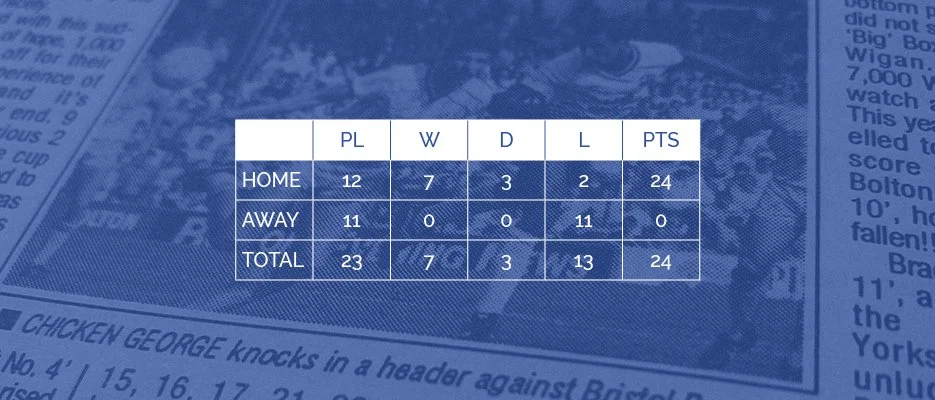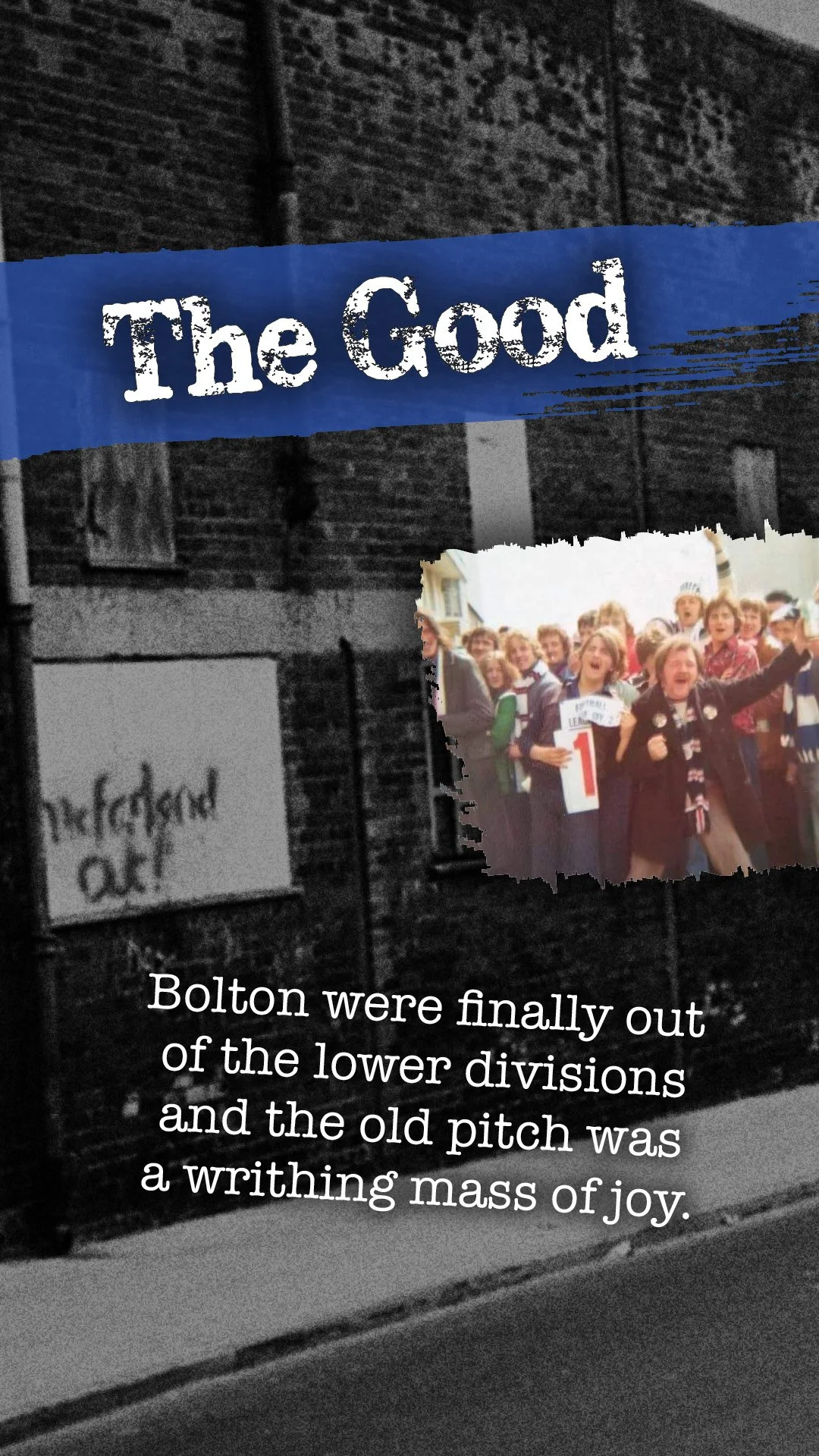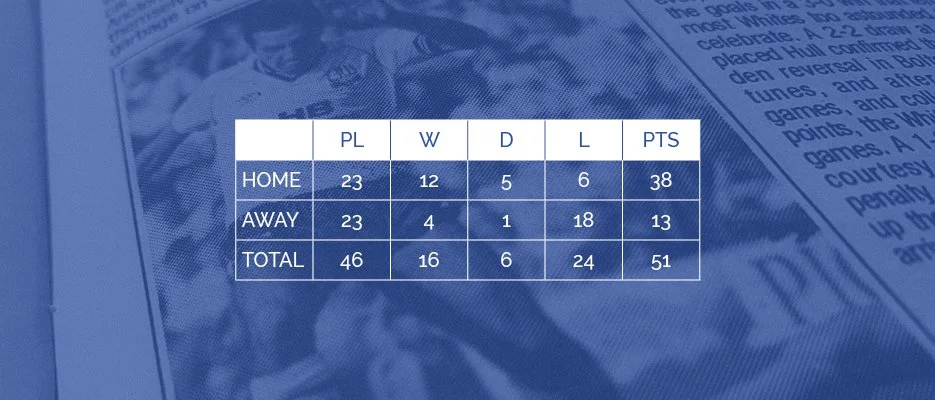ARCHIVE: The Dark Ages #2
Part 2 – Season 1984/85
The second season in Bolton’s 10-year stint in the lower divisions was perhaps the most soul destroying.
Yet the precedent was there for this to be a promotion season. In the early 1970’s the Whites had been relegated to Division Three for the first time in their history. In their first season they finished mid-table, in the second they went up as champions. Hopes were high therefore of a repeat scenario. The 1983/84 season had seen Bolton finish tenth, this season we would go up as champions, such was the thought process of most Wanderers diehards.
Independent observers saw things differently however, Bolton went into this season with, if anything, a weaker squad than the previous year. John McGovern had no money at his disposal. The sale of Neil Redfearn to Lincoln in the close season, for a ridiculously small fee of £7,500 was a blow. Redfearn had shone in midfield, the previous season and looked to be maturing. His replacement was the Paul Lodge, signed on a free transfer from Preston having previously been at Everton. He made little impression. Whilst Redfearn went on to carve out a career at Crystal Palace, Watford, Oldham and Barnsley, Lodge resurfaced as captain of Witton Albion in 1990, when we played them in the F.A. Cup. The only other new player was a young Mark Came, signed for a nominal fee from Winsford. He was of course to provide a few years of very solid service in the long run, but his immediate impact was small. McGovern had signed him to provide cover for his back line of Brian Borrows, Neil Berry, Ray Deakin, Peter Valentine and Gerry McElhinney all old faces. Three youngsters were also blooded in the defence during the course of the season. Paul Booth made only one appearance and Paul Fitzpatrick made three. Jimmy Phillips on the other hand, made his debut on the first day of the season, and dominated the left back berth all term. He was, at the age of 17, inexperienced and prone to errors, but he unseated Ray Deakin, Bolton’s regular left back who was from now on to be found more often in central defence.
In the midfield, Lodge was to make just four anonymous appearances. Steve Thompson, Warren Joyce and Graham Bell were the main choices throughout the season, and midfield was to prove perhaps the biggest problem. Thompson and Joyce were still both relatively inexperienced, but made 79 out of a possible 92 League appearances between them. If it hadn’t been for the creativity of Jeff Chandler on the wing, this could have been a relegation season. He was the scorer of 16 league goals and provider of countless others. The main beneficiary of his skills was again Tony Caldwell, scoring 18 league goals. George Oghani partnered him up front, scoring a creditable 16 league goals. Only the previous season McGovern had been unwilling to select Oghani, preferring Simon Rudge and Wayne Foster. These two remained at the club, but made very little impact, scoring just six goals between them. Roger Walker made one appearance in the forward line, scoring one goal. The squad was completed by the same two goalkeepers as in 1983/84, Simon Farnworth and John Platt.
“There was always the element of “sooner or later we’re going to hammer somebody”, but it never happened.”
It was the first game of the season that was to set the tone for the following 10 months – a 1-0 home defeat to Bristol Rovers and an abysmal performance. Only the Milk Cup (League Cup) was to provide any hope for the fans in the early season. Oldham, at this time an average second tier side, were accounted for in the first round of the competition. Having won the first leg 2-1 at Burnden, it looked certain that Oldham would make their valuable away goal, and divisional status, count at Boundary Park. At the end of extra-time however, it was the Whites who were jubilant on the open terracing after an incredible 4-4 draw. If Bolton could do this to Oldham, what would they do to teams in their own division? The answer was not a positive one. A 3-2 defeat at Derby, sparked an incredible run of straight away defeats, it wasn’t until the end of January that the Whites recorded their first away points. By October, away matches on Saturday’s assumed an air of resignation. There was always the element of “sooner or later we’re going to hammer somebody”, but it never happened.
A 0-0 draw at home to Hull and two lame defeats, 3-1 at Rotherham and 2-1 at Swansea followed. With five games completed, one point had been collected and promotion hopes were forgotten. For the sixth league game, 3,876 fans turned up to watch the Whites play Plymouth. They witnessed not only the first win, but a nine-goal thriller, which Bolton won 7-2. Caldwell scored a hat-trick and Chandler a brace, before Plymouth put their keeper out on the left wing in desperation. It was an incredible performance and a bolt out of the blue for a team which had so far done nothing.
In the following midweek hopes of a revival here raised higher, in the second round of the Milk Cup against another second tier side in the shape of Shrewsbury at Gay Meadow. With Bolton 2-0 down at half-time it looked bleak. In the second half though, BWFC murdered the Shrews with Oghani and Chandler levelling the scores, and setting up the second leg nicely.
Imbued with this sudden sense of hope, 1,000 Whites set off for their first ever experience of Doncaster, and it’s delightful away end. Nine goals in the previous two games, a creditable cup draw surely all pointed to a win. What followed was one of those mid 80’s occasions. ‘Away Defeat Number 4’ bounded around the corner, pulverised all of the hope from the dwindling band of Whites, and sped off into the distance laughing merrily. Doncaster 2, Bolton 0.
“A 2-1 victory over Bournemouth followed by a Lancashire derby win, 4-0, over an admittedly chronic Preston side.”
The very welcome second league win of the season, 3-1 at home to Walsall, was followed by ‘Number 5’ in the collection of straight away defeats – 3-1 at Reading. The Milk Cup was to continue to buck the trend however, a 2-1 win over Shrewsbury at Burnden seeing Bolton through to round three. Meanwhile two straight home wins gave the league position more respectability. A 2-1 victory over Bournemouth followed by a Lancashire derby win, 4-0, over an admittedly chronic Preston side. One step forward was followed by two steps back as away defeats ‘Numbers 6 & 7’, were soon to dollop unceremoniously down the pan in familiar style. At both Bristol City and Burnley, Bolton twice came from a goal down, only to lose 3-2, and it somehow seemed that the men in white didn’t want to win away.
The Whites reward for knocking out second tier sides in the Milk Cup was… another such side. Sadly the draw meant our game Notts County would be away and the two-legged phase of the competition was over. A mighty band of Whites gathered in the away end at Meadow Lane awaiting a gutsy performance. After 15 minutes all appeared to be going well. Just 17 minutes later one of the more horrific chapters in the life of the average Wanderer had been completed. A little Algerian by the name of Richard Harkouk, demolished the Bolton defence, containing debutant Mark Came, as County scored six goals in 17 minutes (on 15, 16, 17, 21, 22 and 32 minutes). Incredibly the remaining 58 minutes were dominated by Bolton with Wayne Foster scoring a consolation. This has to go down as one of the most unbelievable matches ever witnessed by the White Army!
“A little Algerian by the name of Richard Harkouk, demolished the Bolton defence, containing debutant Mark Came, as County scored six goals in 17 minutes.”
In characteristic Jekyll & Hyde fashion two homes wins followed over Lincoln (1-0) and York (2-1). Away defeat ‘Number 8’ then reared its head, like a striking Cobra, 3-2 again, this time at Newport. Dismissal from the F.A. Cup, 2-1 against Hull, came as no surprise, seeing as how the game was played at Boothferry Park. A 2-1 home defeat against Gillingham then sent Bolton spiralling to the fringes of the relegation zone, before ‘Number 9’ 2-1 at Brentford, pushed them in to it.
A 2-0 home win over Millwall followed however, and pulled Bolton out of the dreadful bottom four. This game sticks in the mind, not only for Caldwell’s 86th and 90th minute winning goals, but also for the appearance of around 200, 1970’s style hardcore Millwall thugs. Myths and legends had been built around these men and their antics, and indeed the chant of “M-I-I-ILL-WALL” sounded menacingly from the Embankment throughout the first half. They were more than matched however by the resident troublemakers in the Manny Road, who were not only happy to communicate their opinions in loud monosyllable fashion to their foes, but to line Manchester Road afterwards in wait of them.
A drab 0-0 draw at home to bottom placed Cambridge preceeded the ‘big’ Boxing Day derby at Wigan. A year earlier 7,000 Whites travelled to watch a 1-0 Bolton win. This year only 4,000 travelled to see McElhinney score an own goal and Bolton lose 1-0 for Chapter ‘Number 10’ in the consecutive away defeats of 84/85.
Bradford was ‘Number 11’, a 2-1 defeat against the table topping Yorkshiremen, was an unlucky scoreline for Bolton after a strong performance, but it meant not one single away point before Christmas. If they didn’t pick up some soon Division Four was a distinct possibility. A 0-0 New Years Day home draw with Orient completed a miserable Christmas, and sent the hard-working McGovern in to the dole queue.
What was required now was an experienced fighter, who knew the lower divisions. Meanwhile Charlie Wright was made ‘caretaker’ manager. After five games in this position it appeared that Wright fitted the bill. A convincing 3-0 win over Derby was followed by an equally comprehensive 2-0 win over Rotherham. It was then that the moment Bolton fans had waited six months for finally arrived. The drudgery of perusing the newspapers and seeing two big fat zeros in Bolton’s away wins and draws column was over. Half way through the season, and after 11 straight defeats, like a phoenix rising from the ashes, a win was recorded. Bristol Rovers on a cold Tuesday night was the venue for this cataclysmic event, a last-minute Chandler penalty securing a 2-1 win. You’d have thought Bolton were returning from Wembley with the Cup, not from Eastville having won three points. Celebrations were wild and uncontrolled, as befits such success starved creatures. Won 1, drawn 0, lost 11, sounded and looked fantastic. Things looked even better when we then beat Doncaster 3-1 at Burnden, to lift Bolton to the giddy heights of 12th in Division Three. A month later however, it had all faded from the memory as ‘mid 80s’ nausea returned.
Wright was made manager on the strength of this winning streak. His first full game in charge, resulted in the away defeat habits resuming – this time 2-0 at Plymouth. It was the first in a sequence of abysmal results. An insipid 0-0 draw at home to Swansea, was followed by another 2-0 defeat, at Lincoln. Bristol Rovers it seemed had been a blip.
“The drudgery of perusing the newspapers and seeing two big fat zeros in Bolton’s away wins and draws column was over.”
The Lancashire derby with our old sparring partners from Burnley proved an excellent opportunity, to boost confidence. They themselves were going through a dismal patch in their history, fighting a losing battle against relegation to Division Four. It only took Bolton five minutes to break the goal drought through Joyce, sadly Burnley had already scored in the first minute through Peter Devine. Even more sadly a bearded little winger with the eccentric name of ‘Grewcock’ was to score a spectacular second for Burnley after 15 minutes, before a further goal sealed the double for the Clarets. The atmosphere throughout the game was frenzied, only 6,468 attended, but it seemed that half of them were intent on causing as much physical damage to each other as possible. As if a 3-1 defeat at home wasn’t bad enough, an even more shambolic performance against Bristol City at home followed on the Tuesday afterwards. This time it was 4-1.
With home form dipping, a trip to Preston, in 21st place, seemed the ideal opportunity to record a second away win. Predictably though Bolton lost 1-0, and the 2,000 weary travellers slunk back to Bolton contemplating Division Four. Some of them however, chose to wreck the BR Supporters Special, inducing BR to impose a ban on such specials in future. Bolton’s band of hooligans was now beginning to make national headlines, in the era when football was plagued by organised violence.
Away defeat ‘No. 15’ at Bournemouth, 4-0 came against a forward line fed by Robbie Savage who was later to sign for Bolton. A 1-0 defeat at Walsall, in which Bolton did everything but equalise, was followed by a 2-1 home defeat at the hands of Reading. Ian Bailey, a free transfer signing from Middlesbrough, had made his debut at Bournemouth, and displaced Jimmy Phillips from left back. For the Friday night match at York, Phillips returned to centre back, in what looked like a paper-thin defence. Not only did it keep a clean sheet however, but Phillips scored one of the goals in a 3-0 away win that left most Whites too astounded to celebrate. A 2-2 draw at second placed Hull confirmed the sudden reversal in Bolton’s fortunes, and after going nine games, and collecting only three points, the Whites got four from two games. A 1-0 win over Wigan, courtesy of a late Chandler penalty, pushed Bolton further up the table, and a revival had arrived at just the right time.
“All of a sudden a route to Wembley had miraculously appeared in the club’s darkest hour.”
Before the season could be consigned to the hazy museum of memory, one final debacle of calamitous proportions awaited. It was of course away from home, and even more predictably in London. It takes second place behind the Notts County fiasco in the 84/85 hall of shame, and had dedicated Whites close to tears. With Bolton 3-1 up at Orient with 30 minutes left, it looked as though the London jinx that had run since 1978 was over. Not so. When the second Orient goal went in, things became so predictable. A feeling not unlike watching a ‘goals compilation video’ pervaded. You just knew what was going to happen next, but had to watch anyway. The 2-3 scoreline soon became 3-3, before Kevin Godfrey made it 4-3 to the Brisbane Road outfit. It was the kind of defeat from an impregnable position that diehards don't forget – horrendous stuff.
A 3-1 home win over Newport ensured Division Three survival. It was followed by a 2-1 victory over Darlington in the ‘Freight Rover Trophy’, and all of a sudden a route to Wembley had miraculously appeared in the club’s darkest hour. Victories over Crewe and Rochdale had got the Whites to this stage.
A third league away win, 3-2 at Gillingham, was a surprise result since they were high in the League. A 1 -1 draw at home to Brentford, was however followed by yet another London ‘drumming’, 5-2 at Millwall. Promotion bound. Bradford then visited Burnden as Champions elect, they won 2-0 thanks to a couple of Ray Deakin errors. The attendance of 7,712 turned out to be the highest of the season, with 3,500 coming from Yorkshire. The following week was the horrible fire at Valley Parade Bolton’s fourth away win of the season, 3-2 at Cambridge, was completely overshadowed by those events.
A 2-1 home defeat to a Neil Whatmore and Ian Greaves inspired Mansfield Town wiped out any dreams of Wembley, and so ended another crap season. Charlie Wright had plenty of sorting out to do, again with little money to spend. Caldwell had finished top scorer with 22 goals in league and cup, but not far behind were Chandler (20) and Oghani (21).
Dark Ages – Part 2 first appeared in issue 2 of Come On Feel The Wanderers fanzine back in 1994.






